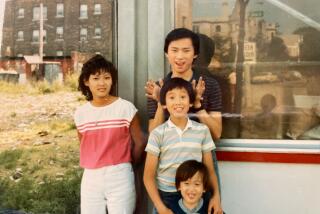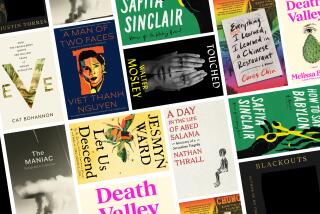Author Recalls a Life Spent Trying to Be His Father’s Son : Books: John Espey’s account of growing up in a missionary home in China has been nominated for national book critics award.
- Share via
J ohn Espey is learning to ride his gleaming new bicycle. The young son of a Presbyterian missionary in Shanghai, he wheels the awesome machine out onto the oval driveway, repeatedly straddles it, wobbles and sprawls on the gravel.
He had hoped that Father would give him some pointers, but the house remains stubbornly silent. Still, at tea time, his cuts swabbed with iodine, the boy manfully announces that he has mastered the vehicle. “I noticed you out there on occasion,” his father solemnly replies. In “Strong Drink, Strong Language,” Espey, now 78, recounts such rites of passage from his childhood in China. Born and raised in Shanghai, he grew to manhood in the twilight of colonialism, under a strict code of puritanical ethics and etiquette.
In his book, which has been nominated for a National Book Critics Circle Award, Espey describes how learning to ride a bike or play tennis was an occasion for serious moral training. Good manners taught that the right sort of people buckled their knickers below, never above, the knee, and a proper Boy Scout had a coolie to carry his knapsack to summer camp in the mountains.
A lifetime away from these events, the author reminiscences over his experiences as he sits in the living room of his Topanga Canyon home. He is surrounded by photographs of his children, a grandchild, his deceased wife, and his companion of years, novelist and critic Carolyn See.
Professor emeritus of English at UCLA, an authority on Ezra Pound, a former Rhodes Scholar and the author of three previous books of memoirs and two novels, he is still as rangy and long-limbed as he was in his youth, and his stories from that time seem to have happened only moments ago. They tumble over each other, told with a raconteur’s grace and charm. Yet, as he speaks of his father, and his lifelong effort to be a good son to him, Espey’s pain slips through, as subtle and sharp as a paper cut.
“I loved this man. He didn’t teach me to ride a bicycle, but he did everything he thought a father should do,” he says of Espey senior, the central figure in the book.
While his mother was liberal and intuitive, his father, he says, “remained severe and strict. We were no longer to call him Dad after age 12,” he says of himself and his older sister. Strong drink and language, as well as conversations about sexual relations, were forbidden.
Because of his father’s sensibilities, Espey postponed publishing the book until many years after his parents’ deaths in the 1960s. “He simply would not have liked to have anything personal about his life mentioned,” he says of his father.
An anecdote about his father beating out a rival for his mother’s hand would have especially rankled him. Even now, Espey’s sister, who is 81, hesitates to send a copy of “Strong Drink” to a cousin whose uncle was the other suitor. “She’s pretty sure this woman will recognize her uncle, though I’ve disguised the names,” Espey says.
After all, his last book of memoirs, “The Other City,” published in 1950, ran into parental censorship when portions of it were excerpted in the New Yorker.
“They told me I was embarrassing them in the eyes of their friends by revealing the fact I had been to a nightspot in Shanghai by the time I was 17.” So, being a dutiful son, he says, he deleted the offensive anecdotes from the final manuscript and wound up with what he calls a weakened book.
This fourth volume of memoirs--the first two were published in the ‘40s without mishap--has been nominated for a National Book Critics Circle Award in biography/autobiography, which will be presented Saturday in Claremont. “Strong Drink” tackles subjects barely discussed under the missionary’s roof. For instance, Espey says that when he first heard the facts of life, “Father gave me the proper instructions, but in such exalted terms that I remember saying, ‘But what do you do then?’ So I went to the cook.”
Espey senior was better at instructing his son in tennis. A compact, athletic man, he yearned for his skinny asthmatic son to excel in the game. After years of uninspired volleying, Espey shone in a father-son tournament at a seaside resort the summer after his sophomore year in high school. Pulling through for his father, who had inexplicably sunk into a slump, he won the starting set, though they lost the game.
“That first set is burned in my memory. I could give you almost every serve and return. It meant so much to Father,” he recalls. “I was doing it for him.”
If young Espey did not live up to his father’s expectations in sports, he and his sister both fell short of the mark in matters of religious doctrine.
“My father went to China to save the souls of the Chinese, but neither of his children were what he would have called Christians. I had no sympathy with the mission movement.”
According to unspoken rules, a social hierarchy was established among the denominations. Separation began at Boy Scout camp where patrol groups were formed by sects, the sons of Presbyterians and Episcopalians belonging to the prestigious Pine Tree Patrol.
“We knew we deserved our own patrol. Nobody else could get into it. The poor Methodists and Lutherans could be Badgers or Coyotes if they wanted to.”
Relations with the Chinese were even more severely controlled. Servants were on hand to help the boys at summer camp “as we became democratic, independent American Boy Scouts,” Espey observes.
As he grew older, Espey became increasingly aware of the unequal status of Westerners and Shanghai citizens. “Shanghai had a definite feeling of outpost-of-empire,” he says, noting that the British were the true experts when it came to being colonial rulers.
“There was frequently a considerable difference in behavior between British and American businessmen. Sometimes it wouldn’t even occur to the British to ask their Chinese equal to sit down. It was just another Oriental. Americans tended to be hail fellows well met and wouldn’t feel comfortable (with such behavior).”
In his junior year of high school, Espey watched a Vietnamese policeman, brought to Shanghai by the British, beat a coolie on a city street. The experience turned him into a lifelong anti-imperialist. “I must have seen this kind of mistreatment a dozen times, but suddenly, I saw it in a certain light. I realized that in that society I had a privileged position which I felt I had no right to have.
“That confirmed my feeling that I would never have a career in China. I was going to be an American. I was going to live in America.”
In 1930, Espey came to the United States to study at Occidental College, later teaching English there before moving to UCLA. When his parents retired not long afterward, they moved to Pasadena, and once a week Espey would drive to have dinner with them. Before entering the house, he would have a snort from his whiskey bottle, summoning his courage.
“I felt greatly hurt that even at the end of his life, we didn’t communicate,” he says of his father. “He felt that my work was frivolous. I really should have been out there converting souls.”
By then, Espey was immutably American. After years here, he says his Mandarin and Shanghai dialect are rusty. But, he adds, “I still think of Shanghai as my city.”
On a trip there last summer, he found that Shanghai also still claimed a part of him. When he stepped out in the street in front of a cyclist one morning, the man shouted that he was a stupid, round-eyed foreign devil. Without a second thought, Espey shot back a popular local obscenity involving the cyclist’s mother.
“He almost fell off his bike,” Espey says with satisfaction.
More to Read
Sign up for our Book Club newsletter
Get the latest news, events and more from the Los Angeles Times Book Club, and help us get L.A. reading and talking.
You may occasionally receive promotional content from the Los Angeles Times.










